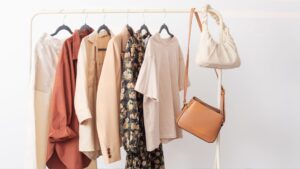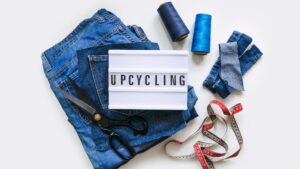Discover a stylish way to go green! Your wardrobe can showcase your values and maintain its charm for years to come. By incorporating sustainable fashion wardrobe practices, making eco-friendly clothing choices, and following ethical fashion tips, you can curate a closet that’s both chic and kind to the planet.
Table of Contents
What is a Sustainable Fashion Wardrobe?
A sustainable fashion wardrobe is more than just a trend; it’s a lifestyle. It’s about curating timeless pieces that prioritize quality over quantity. This approach reduces waste, minimizes environmental impact, and supports ethical practices in the fashion industry. Instead of following fast fashion, focus on versatile, durable, and responsibly sourced garments.
Eco-Friendly Clothing Choices Made Easy
Building a wardrobe with eco-friendly clothing choices doesn’t mean sacrificing style. Here are a few ways to get started:
- Choose Natural Fabrics
Opt for organic cotton, bamboo, or linen instead of synthetic fabrics. These materials are biodegradable and gentler on the environment. - Embrace Secondhand Shopping
Thrift stores, vintage shops, and online marketplaces are treasure troves for unique and affordable finds. Reusing clothing reduces demand for new production and gives garments a second life. - Invest in Quality, Not Quantity
Spend a little more on durable pieces that will last for years. Fewer, better-quality items reduce waste and save money in the long run.

Ethical Fashion Tips for a Conscious Closet
Making ethical fashion choices can be simple with these actionable tips:
- Research the Brands You Support
Look for brands that prioritize fair wages, safe working conditions, and environmentally-friendly manufacturing. Certifications like Fair Trade or GOTS (Global Organic Textile Standard) can guide you. - Repair Before You Replace
A rip or missing button doesn’t mean the end of a garment’s life. Learn basic sewing or support local tailors to extend your clothing's lifespan. - Capsule Wardrobe Planning
Build a capsule wardrobe with essential pieces that can be mixed and matched. This reduces impulse buying and ensures you have versatile options for any occasion.

Why Sustainable Fashion Matters?
The fashion industry is one of the largest contributors to pollution, consuming vast natural resources and generating significant waste. Embracing sustainable fashion is essential not only for reducing environmental harm but also for fostering positive societal change.
- Environmental Conservation
Sustainable fashion minimizes the use of water, energy, and other resources in clothing production and consumption. It helps reduce carbon emissions and plastic waste, protecting our planet's ecosystems. - Waste Reduction
The fast fashion cycle leads to massive amounts of clothing ending up in landfills. Sustainable practices like reusing, recycling, and repairing clothing significantly reduce textile waste. - Ethical Labor Practices
Sustainable fashion supports brands and industries that prioritize fair wages, safe working conditions, and respect for human rights, ensuring a more ethical supply chain. - Responsibility for Future Generations
By adopting sustainable fashion, we contribute to preserving the planet for future generations, promoting a healthier and more equitable world.

Green Fashion Practices
Green fashion promotes sustainability and ethical practices in the clothing industry. Key practices include:
- Eco-Friendly Materials: Using sustainable fabrics like organic cotton, bamboo, and recycled textiles.
- Upcycling & Recycling: Repurposing old clothes to reduce waste.
- Ethical Production: Supporting brands with fair wages and safe working conditions.
- Slow Fashion: Focusing on high-quality, timeless pieces over fast fashion.
- Secondhand Shopping: Buying vintage or secondhand clothes to reduce new production.

Building a sustainable fashion wardrobe is more than a personal statement; it’s a commitment to the planet and the people who make our clothes. By embracing eco-friendly clothing choices and following ethical fashion tips, you can reduce waste, support fair labor practices, and promote a healthier environment. Every small step—whether it’s choosing quality over quantity, repairing a favorite piece, or researching ethical brands—creates a ripple effect of positive change.
